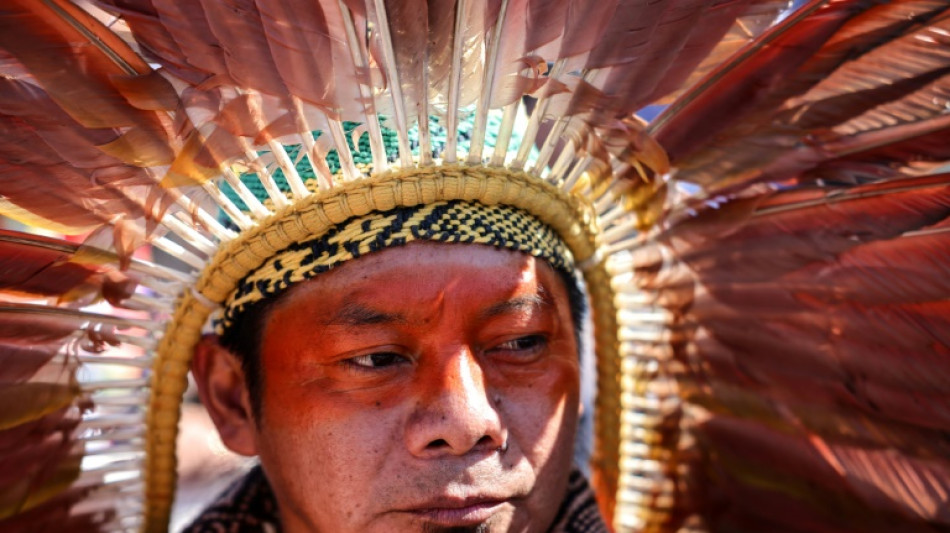
-
 Barca beat Mallorca to extend Liga lead
Barca beat Mallorca to extend Liga lead
-
Gyokeres lifts Arsenal nine clear as Man Utd pile pressure on Frank

-
 Late Guirassy winner for Dortmund trims Bayern's lead atop Bundesliga
Late Guirassy winner for Dortmund trims Bayern's lead atop Bundesliga
-
'Free the mountains!": protest in Milan over Winter Olympics

-
 Gyokeres double helps Arsenal stretch Premier League lead
Gyokeres double helps Arsenal stretch Premier League lead
-
BMW iX3 new era SUV

-
 Six Nations misery for Townsend as Italy beat sorry Scotland
Six Nations misery for Townsend as Italy beat sorry Scotland
-
Spain, Portugal face fresh storms, torrential rain

-
 Opinions of Zuckerberg hang over social media addiction trial jury selection
Opinions of Zuckerberg hang over social media addiction trial jury selection
-
Over 2,200 IS detainees transferred to Iraq from Syria: Iraqi official

-
 Norway's Ruud tops Olympic men's freeski slopestyle qualifying
Norway's Ruud tops Olympic men's freeski slopestyle qualifying
-
Czech qualifier Bejlek claims first title in Abu Dhabi

-
 French duo reach Shanghai, completing year-and-a-half walk
French duo reach Shanghai, completing year-and-a-half walk
-
Australian snowboarder James eyes elusive Olympic gold

-
 Sequins and snow: Eva Adamczykova makes Olympic return
Sequins and snow: Eva Adamczykova makes Olympic return
-
Vonn set for Olympic medal bid after successful downhill training

-
 Shepherd takes hat-trick as West Indies beat Scotland in T20 World Cup
Shepherd takes hat-trick as West Indies beat Scotland in T20 World Cup
-
Sausages will sell after thrill-seeker Von Allmen wins Olympic downhill

-
 Swiss racer Von Allmen wins first gold of Winter Olympics
Swiss racer Von Allmen wins first gold of Winter Olympics
-
'Wake up': Mum sparks comeback after scare for freeski star Gu

-
 Von Allmen wins men's Olympic downhill gold, first of Games
Von Allmen wins men's Olympic downhill gold, first of Games
-
First medals up for grabs at Winter Olympics

-
 Afghanistan captain Khan harbours dream of playing in Kabul
Afghanistan captain Khan harbours dream of playing in Kabul
-
Lindsey Vonn completes second Winter Olympics downhill training run

-
 Freeski star Gu survives major scare in Olympic slopestyle
Freeski star Gu survives major scare in Olympic slopestyle
-
Iran FM looks to more nuclear talks, but warns US

-
 Hetmyer's six-hitting steers West Indies to 182-5 against Scotland
Hetmyer's six-hitting steers West Indies to 182-5 against Scotland
-
After boos for Vance, IOC says it hopes for 'fair play'

-
 Thousands gather as Pakistan buries victims of mosque suicide attack
Thousands gather as Pakistan buries victims of mosque suicide attack
-
Lindsey Vonn completes second downhill training session

-
 US pressing Ukraine and Russia to end war by June, Zelensky says
US pressing Ukraine and Russia to end war by June, Zelensky says
-
Faheem blitz sees Pakistan avoid Netherlands shock at T20 World Cup

-
 Trump refuses to apologize for racist clip of Obamas as monkeys
Trump refuses to apologize for racist clip of Obamas as monkeys
-
Takaichi talks tough on immigration on eve of vote

-
 England's Salt passed fit for T20 World Cup opener
England's Salt passed fit for T20 World Cup opener
-
Spain, Portugal brace for fresh storm after flood deaths

-
 Pakistan bowl out Netherlands for 147 in T20 World Cup opener
Pakistan bowl out Netherlands for 147 in T20 World Cup opener
-
Pushed to margins, women vanish from Bangladesh's political arena

-
 Crypto firm accidentally sends $40 bn in bitcoin to users
Crypto firm accidentally sends $40 bn in bitcoin to users
-
Pistons end Knicks' NBA winning streak, Celtics edge Heat

-
 Funerals for victims of suicide blast at Islamabad mosque that killed at least 31
Funerals for victims of suicide blast at Islamabad mosque that killed at least 31
-
A tale of two villages: Cambodians lament Thailand's border gains

-
 Police identify suspect in disappearance of Australian boy
Police identify suspect in disappearance of Australian boy
-
Cuba adopts urgent measures to address energy crisis: minister

-
 Not-so-American football: the Super Bowl's overseas stars
Not-so-American football: the Super Bowl's overseas stars
-
Trump says US talks with Iran 'very good,' more negotiations expected

-
 Trump administration re-approves twice-banned pesticide
Trump administration re-approves twice-banned pesticide
-
Hisatsune leads Matsuyama at Phoenix Open as Scheffler makes cut

-
 Beyond the QBs: 5 Super Bowl players to watch
Beyond the QBs: 5 Super Bowl players to watch
-
Grass v artificial turf: Super Bowl players speak out


Amazonian chief at UN to combat traditional knowledge piracy
The leader of the Brazilian Amazon's Huni Kui people remains hopeful that a planned United Nations treaty will advance the fight against biopiracy: the pillaging of traditional knowledge and genetic resources.
However, discussions towards concluding the agreement are progressing "very slowly", Chief Ninawa told AFP on the sidelines of the treaty talks at the headquarters of the UN's World Intellectual Property Organization in Geneva.
Wearing traditional costume, Ninawa officially blessed the WIPO diplomatic conference, with music and song, during a ceremony in front of negotiators.
"Indigenous peoples have always placed their trust in the UN", he said, though he deplored that though there were "declarations and recommendations to states, things do not change" -- and the plundering of traditional knowledge continues.
But "we want to keep faith in the UN", he said.
The draft treaty being finalised at WIPO -- the UN's agency for patenting, IP and innovation -- has been in the works for more than 20 years following a first request launched by Colombia in 1999.
It would require patent applicants to disclose the country of origin of an invention's genetic resources, and whether it is based on traditional knowledge.
- Traditional medicine pirated -
"Many plants are used in traditional medicine. Companies are appropriating this knowledge to make perfumes and medicines," Ninawa said.
While natural genetic resources -- such as those found in medicinal plants, agricultural crops and animal breeds -- cannot be directly protected as intellectual property, inventions developed using them can be patented.
These resources are increasingly used by companies in everything from cosmetics to seeds, medicines, biotechnology and food supplements, and have enabled considerable progress in health, climate and food security, according to the UN.
But developing countries deplore that patents are granted without Indigenous peoples being informed, for so-called inventions that are not really new because they are based on traditional knowledge.
"As connoisseurs and protectors of this knowledge, we have much to contribute to humanity," said Ninawa.
However, "in South America and Brazil, many companies have appropriated the traditional and genetic knowledge of Indigenous peoples" without their authorisation.
The Amazonian leader said that, much to his regret, the Brazilian authorities did not consult with them -- even if President Luiz Inacio Lula da Silva "has a lot of will to change things".
"But it does not depend only on President Lula," he said.
- Ayahuasca brew -
Ninawa cited ayahuasca as a case in point.
A psychoactive brew prepared from vines by the people of the western Amazon basin, ayahuasca is seen, depending on the version, as a miracle cure, a tool for inner exploration and personal development, a recreational hallucinogen, or a dangerous psychotropic drug.
In certain countries, psychedelic tourism has developed around ayahuasca, which can also be bought online, in capsules or as an infusion.
"There are a lot of laboratories that want to do research (on ayahuasca) to treat people with psychological or mental problems," said Ninawa.
The community he leads, comprising 17,000 people in Brazil and 4,000 in Peru, feels in danger from biopiracy.
"The way they enter our community, in search of traditional and ancestral knowledge, represents a very real, very strong threat," he said.
The battle against biopiracy could reach a turning point if WIPO's more than 190 member states manage to conclude an agreement. The talks in Geneva are scheduled to last until May 24.
"We came here to bring a declaration from the Indigenous peoples of Brazil, to highlight the problems that the appropriation of our knowledge causes for our communities," explained the Huni Kui leader.
This knowledge "is part of our spirituality, it is not resources for the economy".
"It is very important that governments and leaders know: our relationship with Mother Nature is not economic but a way of being in a relationship with life."
A.AbuSaada--SF-PST


